Updated Daily. This week’s issue:
– Presidential Human Rights Council Members Appeal to Investigative Committee on Missing Soldiers
– Russian Defense Ministry Meets with Soldiers’ Mothers, Human Rights Advocates
– Russian Soldier ‘Fighting as Insurgent’ Killed in Ukraine: Kyiv Post
– Persecuted Russian Parliamentarian Ponomarev Decides to Remain Abroad
– Cell Phone Messages of Moscow Municipal Candidate Leaked to State Media
– “There’s No Such Thing as a Former Paratrooper”
– Russian Blogger Asks Hard Questions about Death of State Photographer Stenin
– Russian Journalists Ordered Not to Write About Reports of Stenin’s Death
– Reactionaries Propose ‘Anti-Maidan’ Patrols to Counter Russian Opposition Protests
– On 10th Anniversary of Beslan Tragedy, Russian State Media Re-Write History
– Anti-War Protesters Arrested in Moscow for Candlelight Vigil
– Lone Anti-War Pickets in Moscow, Yekaterinburg
Last Week’s Issue:
-Kremlin advisor Sergei Glazyev speaks in Yalta, surrounded by separatists and European far right; advocates for “Novorossiya” to join Customs Union.
-There was an anti-war rally in St. Petersburg.
-Lev Shlosberg, Pskov deputy who investigated Pskov paratroopers’ deaths, assaulted, hospitalized; he links his attack to his investigation, and Acting Governor Turchak condemns attack.
-Russians make Facebook groups and web pages to try to find Russian soldiers MIA or KIA. TV Rain starts a list of researched cases of soldiers killed/captured abroad.
-Solidarity activist arrested at lone picket.
-Journalists investigated how Russian POWs ended up in Ukraine.
-Soldiers’ Mothers of St. Petersburg declared “foreign agents” after probe of soldiers’ death.
-Presidential Human Rights Council members probe disturbing reports of wounded soldiers brought to St. Petersburg.
-The Ukrainian Security Service (SBU) has announced the capture of 9 Russian POWs whose interrogations they have posted online. They may have been mistreated and their confessions are coerced.
–Relatives of the POWs held in Ukraine gather in Kostroma to demand answers, and further details of their capture emerge; the wife of a Russian officer MIA pleads for information about his whereabouts.
-Veteran rocker Andrei Makarevich, the front man for Mashina Vremeni, appeals to Putin to put a stop to the state TV vilification against him for his criticism of the war in Ukraine.
-Prominent civil rights attorney Genri Reznik pickets NTV for a program denouncing anti-war critics.
-Russian blogger Oleg Kashin asks the Russian Defense Ministry hard questions about news of Russian soldiers fighting and dying in Ukraine; the editors of Vedomosti also recall Soviet history and cover-ups of wars and demand that the government tell the truth about Russian soldiers sent to Ukraine.
-Russian journalists have been tracking down news of mysterious deaths of Russian paratroopers abroad — and finding many obstacles to getting at the truth as they are attacked by thugs.
-Juliya Navalny, wife of opposition leader Alexei Navalny, is summoned to give testimony in a contrived “art theft” case but refuses citing Russian constitutional protection against self-incrimination.
-As pictures of the painted star of the Stalin-era building in Moscow in Ukraine’s colors go vial, a campaign begins to call a dare-devil nicknamed “Mustang Wanted” a “Nazi” and “fascist.” The real story is complicated, but Mustang has sparked controversy again by donating his fee from LifeNews to the Donbass Battalion.
-Leonid Martynyuk, opposition author and video producer, was sentenced to 10 days of jail in an incident believed to have been fabricated for retaliation of his expose of the corrupt Sochi Olympics and the cover-up of the downing of MH17.
Please help The Interpreter to continue providing this valuable information service by making a donation towards our costsâ€.
Graham W. Phillips, a British journalist who was formerly a stringer for the Kremlin propaganda site RT.com, and now works as an occasional stringer for Ruptly, another Kremlin propaganda company, has his own YouTube channel where he has been releasing a lot of his pro-Russian videos lately.
Phillips was detained by Ukrainian forces for two days in May, and ultimately deported in July and banned from re-try to Ukraine. Nevertheless, he sneaked back in across the porous border to Lugansk to film scenes of battle there, mainly of the rout of Ukrainian troops and the destruction of their vehicles.
Whatever you want to say about Phillips, he’s there. And sometimes, despite himself, you look over his shoulder and see things that contradict the point of his own propaganda shoots.
Today 5 September, he uploaded his video interview of soldiers fresh from fighting at the Lugansk airport.
The label of the video says “Talking with the Novorossiya Militia at the Lugansk Airport.”
But it soon becomes clear from watching the video that these are not home-grown militia from Ukraine.
The men have the Russian accents of Russian speakers from Russia, not southeastern Ukraine.
They’re wearing the blue berets of Russia’s Airborne Troops Division. To be sure, perhaps they bought the caps in an army depot.
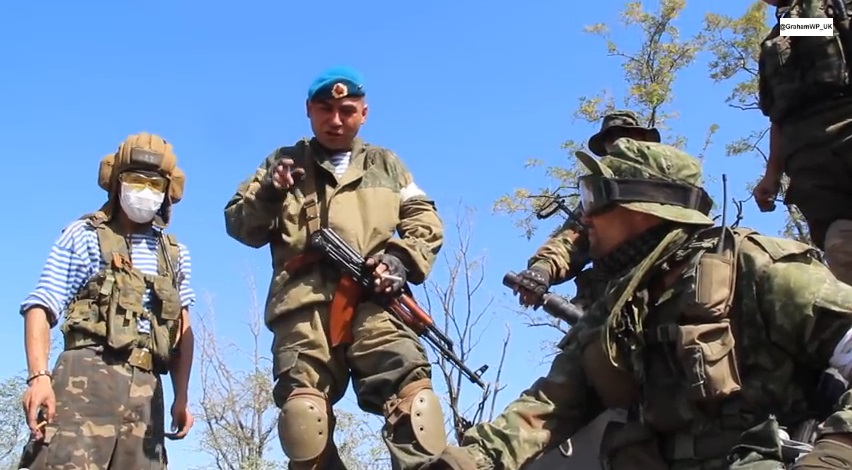
But when someone off-camera asks the men at 1:39, “Guys, who’s from Russia, exactly?” — most raise their hands. At 1:46 they say they are “volunteers”.
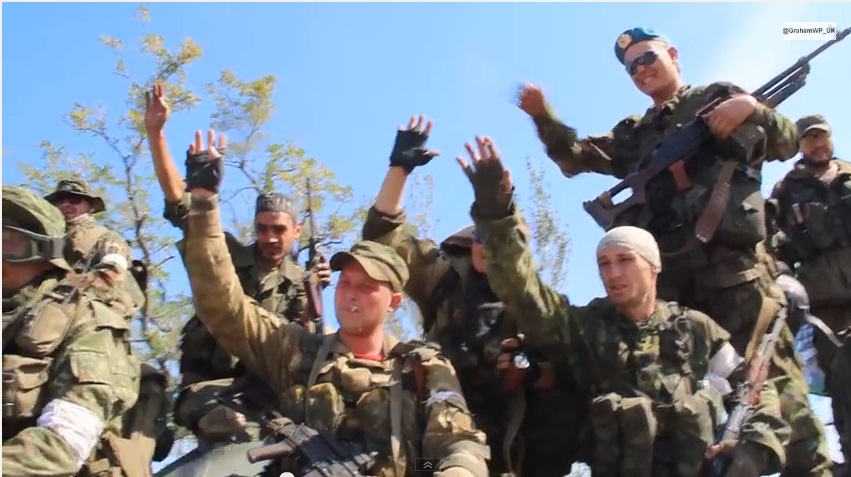
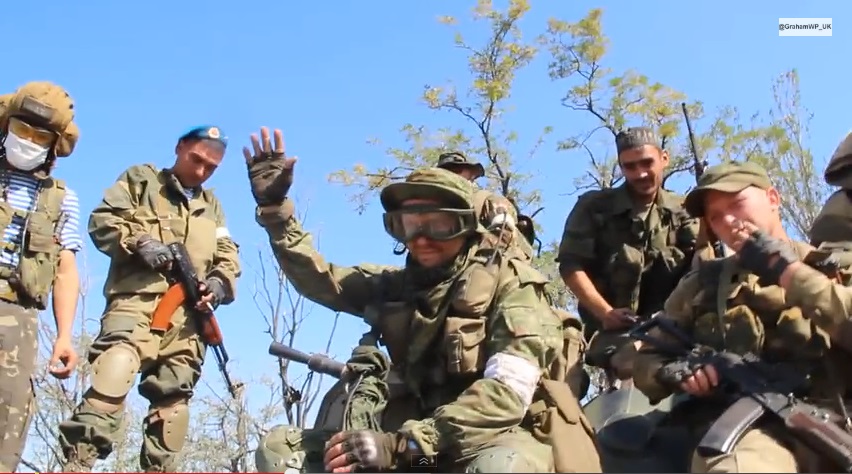
“We bought everything ourselves and came here,” says one soldier. “Well, except the machine guns,” says another. “They aren’t for sale anywhere.”
The main speaker, seated left of center, who had raised his hand to indicate he was from Russia, says he ran a company and is a programmer by training.
When asked what their motivation was, this main speaker said he was ethnically Belarusian — implying that brother Slavs stuck together — except when they don’t. Others said that “a lot of people” were dying. “They propagandized a lot about the Banderaites,” said another.
At 2:14, the soldier in the back smoking and holding his gun upright says, “We are fulfilling our oath.”
Oath…to what? A soldier in the regular army takes an oath. What is the procedure for volunteers for “Novorossiya”?
“It doesn’t matter, wherever they are killing Russian people, here..or in Australia…” says the soldier with the head scarf at 2:19.
The man in the blue beret standing in the back row with the automatic weapon says, “If anyone attacks the Russian people, I have 500 arguments against them,” clapping his gun.
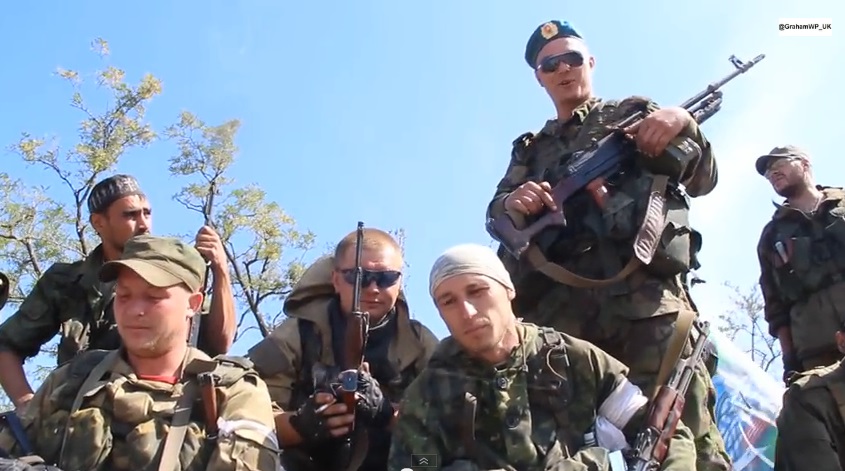
Another man at 2:36 also notes in the background that he gave an oath to defend the Russian people.
At 3:30, the soldier shows the chevron of the Ukrainian paratroopers, which he said was given to him as a souvenir by a Ukrainian soldier “who doesn’t want to fight.”
“They are just like us, we were paratroopers in the past, says the soldier. “There’s no such thing as former paratroopers,” he adds at 3:35.
“Really, a paratrooper shouldn’t fight another paratrooper,” says a soldier — and truly, if they don’t come out from under Gogol’s overcoat, they come out from under the overcoat of the Soviet Red Army.
When asked what TV channel was filming, a voice says “NTV”.
At 4:22 a soldier says, “Mama, forgive me that I deceived to you, Lil’ Sis, too, everything will be fine.” Another says, “Grandma, you can understand now, I’m not studying!” as they realize their relatives may see them on TV.
But then at the end, we get a closer look at the flag flying on the armored vehicle, and as in other photographs taken of the same crew, we see it’s the VDV flag of the Russian Airborne Troops.
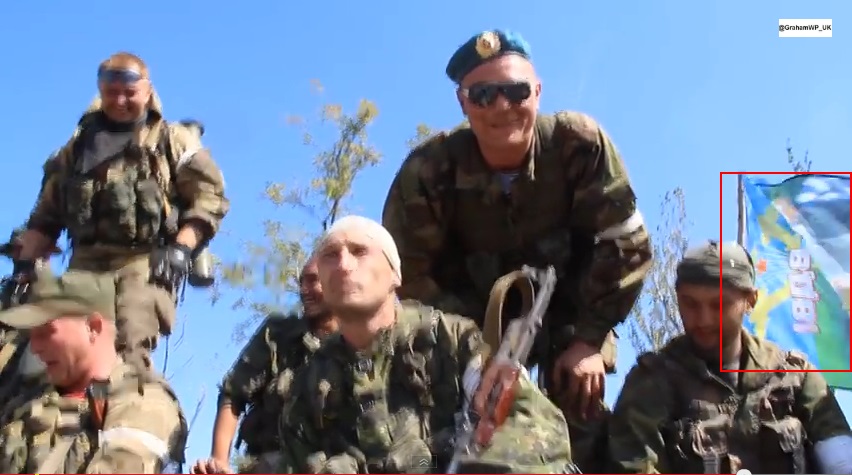
The soldiers are also wearing white arm bands, which is typical of Russian soldiers coming into Ukraine.
Do the Russian Armed Forces really allow irregular soldiers,
volunteers in another country’s “militia,” to use the flags of their
regular troops?
It seems much more likely that these are soldiers under the command of the VDV, even if technically they may be contractors.
It also seems misleading to say “NTV” is filming
— when this video hasn’t been broadcast on NTV (as far as we know), but
is on Phillips’ own YouTube channel.
Phillips has indicated that his video may not be used by “the wrong people.”
The controversies surrounding the life, death and work of Andrei Stenin, RIA Novosti photo correspondent continue to rage on Russian social media.
Stenin, who was embedded with Russian-backed fighters from the “Donetsk People’s Republic,” filmed Ukrainian POWs who were humiliated by the fighters. Not long after filming the POWs, he went missing but then was pronounced dead yesterday after his remains were positively identified with a DNA match. Accusations have been made that Stenin was complicit in torture. As we have noted, the fact that DNR fighters eventually brought at least one POW to the hospital doesn’t exonerate their exploitation of his suffering in propaganda videos.
Meanwhile, the Russian state media is denouncing the Ukrainian armed forces for shelling Stenin’s car. As we have reported, a burnt-out car was found on a road leading to Snezhnoye, near the site of the downed MH17, where battles took place between Russian-backed separatists and the Ukrainian army. A video was taken of this road by Caucasian fighters who appear to be from Russia and outfitted with the latest Russian weapons. A video by the same cameraman shows the fighters traveling in a civilian car.
Oleg Kashin has some questions regarding the death of Stenin for Aleksandr Bastrykin, the head of the Russian Investigative Committee and also Vladimir Sungorkin, head of Kmsomolskaya Pravda and LifeNews’ head Aram Gabrelyanov. Translation byThe Interpreter.
Why was the filming by Andrei Stenin done 1 August published only on 5 August, that is, a day before the supposed day of his death?
Yet another set was taken on the 3rd. Does that follow that Andrei went missing on the 3rd or 4th?
On what date did they find Andrei Stenin?
Where did they find him?
KP, in its reports, indicates a placed called Peresyp, but on Google maps there is only Rassypnoye. Is that what is meant?
What are these lenses found in the area of Donetsk, the photographs of which an employee of Rossiya Segodnya named Shtol published in a group for photographers on 15 August?
If Andrei Stenin was found 15 August or earlier, why wasn’t that reported?
Was Andrei Stenin’s mother informed on the course of the searches?
How fully and in what volume was she told about this?
Where did the version of the story involving tanks and shooting of a convoy of refugees come from?
Were the witnesses questioned? If yes, did officers of the Investigative Committee go to the scene of the tragedy?
Did experts or specialists review the scene of Andrei Stenin’s death?
Which ones?
What were their conclusions?
Are their photographs or videotapes with the general diagrams of the place of the tragedy?
Are there other damaged cars in these videos that would confirm the version of the death of Andrei Stenin?
Why weren’t they published?
Were there armed persons in the car with Andrei Stenin?
Do you know that he went missing along with two activists from Fyodor’s NOD [National Liberation Movement, an ultrnationalist Russian group known for supporting the separatists and their antisemitic TV channel–The Interpreter.]
Do you know that some members of this movement took part in the conflict in Donbass as volunteers?
What was their fate?
Is it true that it follows from the KP reports that Dmitry Steshin and Aleksandr Kots, as well as journalists from LifeNews who found Andrei Stenin touched the items at the crime scene?
Are they witnesses in the case of the murder of the journalist?
Did this hinder the investigation?
Why was the first report of the journalists removed from the web site of Komsomolskaya Pravda?
Did you see the OSCE report about the remains of the journalist found?
What date is indicated there for the finding of Andrei Stenin’s body?
How did the story of Andrei Stenin’s detention by the SBU appear?
On what date did the remains of the body and the camera lenses end up in the hands of specialists?
Did the Russian government communicate with Ukrainian authorities after the first announcements on the detention of Andrei Stenin? Were their contacts in this regard with the leadership of the Ukrainian battalions?
It is known that Andrei Stenin’s telephone was turned on after 5 August, some people answered calls from it and even went on Facebook. Did the Russian government ask the intelligence agencies to trace this activated phone?
Vesti had a program saying that the car in which Andrei Stenin was travelling was not only shelled from Grads but grenades were thrown at it, and also Ukrainian officers came to the scene of the crime and took the personal items of all those killed. Do you know anything about this? Is it true?
Kashin’s questions got a predictably harsh response from the head of LifeNews, a TV channel close to Russian intelligence:
I believe that Kashin with his despicable “questions – half-hints” has
violated ethical normas, just as in the situation with Marat and Oleg –
Ekho.
Kashin boldly asks questions from Geneva, while the guys from LifeNews
and KP risk their lives to conduct an investigation into the death of
Stenin in the Donbas.
Max Katz, an opposition candidate who is running in elections to the Moscow municipal legislature this month, reports that his cell phone messages have been hacked and published in the Russian state media.
Katz, who previously landed a seat in the City Duma in 2012, was running on an independent platform; he had tried and failed to get the nomination from the opposition Yabloko Party.
Translation: But read Katz…it’s really f**ked there truly (“My SMS Correspondence for 2 Years Has Ended up in the Media”) and distribute this.
In
a LiveJournal blog post, Katz said that whoever hacked his account
would have had to have access the cell phone company MTS or access this messages through
SORM (the filtration system of the Federal Security Service (FSB), the KGB’s successor.). Writes Katz (translation by The Interpreter)
They
could not have stolen this from my telephone or from iCloud: then
there would be also be my messages in iMessage in the files, and I don’t
have SMS messages on my telephone for that period. I’ve changed
telephones 3 times, and for a certain time I didn’t have an iPhone.I
am not under investigation, and the law-enforcement agencies have not
questioned me ever, and I have never conducted any activity on the
territory of the RF (except for the City Projects Foundation). I have
never met with foreign diplomats, I have not proposed going against the
Kremlin, and I am not in any underground organizations. I’m an ordinary
man, not particularly distinguished by anything (my City Projects in
2012 would hardly be a reason to place surveillance over me.)Yet my personal correspondence ends up in the media.
You
can say as much as you like, that I am now a candidate for the [Moscow
municipal] deputies and I have to be prepared for such things, but damn.
They were following me for two years, archiving my SMS messages
somewhere through an operator. And it would be fine if truly, the FSB
did this in order to understand whether I was a terrorist, and in order
to stop a terrorist act in time. Many methods are acceptable in the
struggle against terrorist acts and if I knew that some officer reads my
correspondence only with that purpose, I would even perhaps not be
particularly opposed. My police is protecting me, so to speak.But
damn, to leak such files to the media simply because it is convenient
now to dump some sort of compromising materials about me? This just
seems beyond comprehension; how could they track the personal SMS
correspondence of their citizens and use this then in a situation which
not only does not threaten the security of the country but which is not
even connected with any crimes in any way?I can’t believe this.
Let’s come out of the state “yes, everything is lawless in our country”
and think concretely about this situation once again: someone tracked my
SMS correspondence for a minimum of two years and dumped it into the
media. From an ordinary citizen, not someone under investigation, not a
suspect, not a terrorist.
Katz then wrote to Nikolai Nikiforov, the minister of communications and mass media, who has a Twitter account:
Translation: According to procedure, you must write a statement to the prosecutor’s office, since this is a violation of the privacy of communications, stipulated by federal law.
Translation: Always concerned by any facts of unlawful access to personal data of citizens! I have even spoke about this at the UN.
Translation: I will write. But if a minister would also express concern about this situation, I am confident the case would go much more actively : )
Translation: Friends, only two journalists for now have taken an interest in the leak of my personal correspondence and they are both foreign : ( What’s that all about?
Correspondence has in fact been leaked before, likely with involvement of the FSB. The telephone conversations of opposition leader Boris Nemtsov, former first deputy prime minister, were leaked to the press to create a scandal, outing his frank assessments of other opposition figures, and the email of opposition leader and anti-corruption blogger Aleksei Navalny has also been leaked.
It is routine for state TV, notably NTV, to follow opposition leaders and record their meetings and conversations and also police searches of their home, and broadcast them in denunciation programs on the news.
Russian parliamentarian Ilya Ponomayev has decided to remain abroad and not return to Russia without guarantee that he will be allowed to travel again, RBC.ru reported.
Ponomarev, a deputy of the State Duma from the Just Russia party, is the sole member of the Russian parliament to have voted against the forcible annexation of Crimea, which has unleashed a flood of hate against him in the state-run media.
In an interview with RBC.ru, Ponomarev said he did not intend to emigrate and would continue to work as a deputy. He is currently in California and plans to travel to China and Malaysia.
The Federal Service of Court Bailiffs (FSCB) issued a decision to ban him from travel abroad in July.
Ponomarev says he has been attempting to get in touch with the FSCB. Back in July, he was assured that no restrictions would be placed on him in connection with a fine from a court case related to Skolkovo, a project started under President Dmitry Medvedev to encourage technical innovation but which began to experience political and legal troubles after Putin replaced him as president.
Ponomarev was charged with receiving lecture fees amounting to $750,000 but failing to perform all the lectures, and was ordered to return the fees. He appealed the decision, which was widely viewed as politically motivated, as authorities claimed Skolkovo was “funding the opposition” in this way. In July, the Supreme Court upheld the fine.
Meanwhile, Aleksandr Ageyev, the head of Just Russia, told RBC.ru the party would demand that Ponomarev give up his seat, and he had already been informally expelled from the faction. Ponomarev had already announced he was leaving the part in October 2013, citing a change in the line as conservatives rejected a past opposition platform. Earlier, an attempt had been made to expel Ponomarev when he joined the opposition’s Coordinating Council.
On 1 September, a fake account issued a claim on Twitter that “Ponomarev’s body was found in the woods.” The tweet was subsequently deleted but not before some panic was spread.
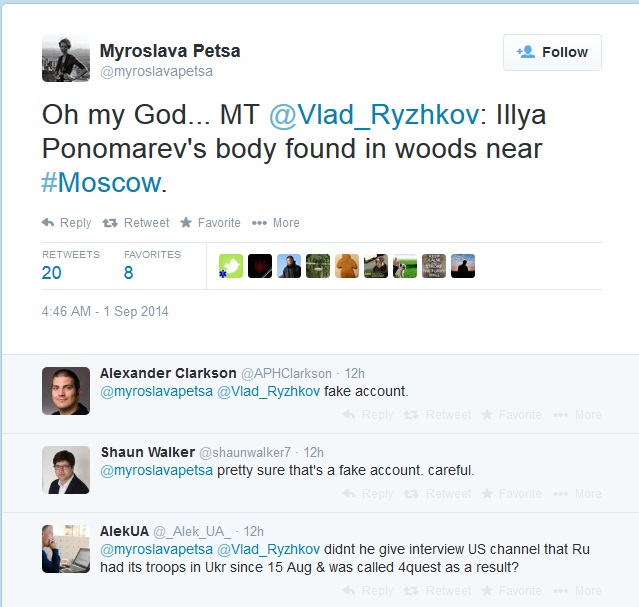
The tweet was made by @Vlad_Ryzhkov which is an imposter account of Vladimir Ryzhkov, co-chair of the opposition party RPR-Parnas. The real Ryzhkov’s Twitter handle is @respublicanex.
Ryzhkov, who published a notice in gazeta.ru explaining that the account was not his, and that reports that he was beaten were not true. “About once a month he writes that someone has been beaten, murdered, blown up, etc. On Shenderovich’s birthday, he wrote that he was beaten.”
The fake Ryzhkov also tweeted that there was a connection between Ponomarev’s statements about the Russian invasion of Ukraine and the court action.
Translation: Ilya Ponomarev told CNN that the RF had brought forces into Ukraine back on 15 August. That evening Ilya got a summons to the Investigative Committee.
But Ponomarev was already under investigation before that. His speech about the Russian invasion was widely denounced on pro-Kremlin and state media sites, and he was called a “traitor.”
On 29 August, an article appeared in Quarz magazine titled “An opposition Russian deputy has an idea to weaken Moscow’s influence in Europe”:
Now, with Russian forces on the march
in eastern Ukraine, Ponomarev is offering up his influence to help
counterbalance Moscow’s chief leverage in Europe, which is its dominance
of the continent’s natural gas supply.Ponomarev
tells Quartz that, to temper Russian influence, Europe needs to develop
its shale gas reserves, as the US has—and that he can help by
diminishing European political opposition to hydraulic fracturing, or fracking, the drilling method used to extract gas from shale.Anti-fracking
protests have broken out in Bulgaria, France, Poland, Romania, the UK
and elsewhere, leading to bans on the practice in Bulgaria and France.Critics, including Ponomarev, say that Russia is financing
some of the protests. And he was in Washington this week to offer his
paid lobbying services to Western energy companies that either are or
hope to begin fracking in Europe.
This is sure to make him further enemies in Russia and among liberals and environmental activists in the West.
The Kyiv Post has published a translation of a report in the independent Russian newspaper Novaya Gazeta about another soldier who died fighting in Kiev, Anton Tumanov. This case has been added to those documented as confirmed by TV Rain, bringing the total to 28. In addition, there are cases of 9 other soldiers from Dagestan which is the subject of an inquiry by the Soldiers’ Mothers of St. Petersburg to the Investigative Committee, and many dozens more missing which are being investigated.
The article is titled “There Was No Other Job,” and describes how Tumanov of Mari El Republic went off to Rostov Region, told his girlfriend in July he was going to war, where Russian soldiers were “fighting as insurgents” in Ukraine, and came home in a sealed coffin. Tumanov was a soldier in the 18th Motor Rifle Brigade, formation 27777, and died in battle 13 August after having his legs torn off from shrapnel.
Racheva interviewed his mother, who said he went into the army because there were few jobs in Kozmodemiansk, his hometown in the southwest of Russia.

Tumanov in Rostov. Photo by Novaya Gazeta.
On Aug. 11 Tumanov got two grenades and 150 machine gun cartridges. On 3 p.m. he sent his mother a message in Vkontakte social network saying: “Turned in my phone. Left for Ukraine.” That was all.
“I can’t understand how they could send them there. It was a big formation – 1,200 people. I didn’t even know who to call to. I didn’t have any of his commanders’ contacts. If I did, I would call and say: ‘Don’t you dare send him!’” Tumanova says.
Tumanov’s fellows from the military unit 27777 told the family what happened next, when they came to Kozmodemiyansk after the funeral to deliver the papers. They brought a notarized document detailing Tumanov’s death.
According to the servicemen, the order to cross the Ukrainian border came on Aug. 11. Those who refused were insulted and threatened by the commanders. They were ordered to turn in their phones and documents, change uniform and paint over number plates on their vehicles. Every soldier received thin white bands for their arms and legs.
Later Tumanova found in Vkontakte a photo of her son wearing such a band, with a comment by his fellow serviceman explaining that soldiers were moving the bands to a different arm or leg every day to signal to other squads that they are on the same side.
On the night of Aug. 12 a column of 1,200 soldiers entered Ukraine and arrived in Snizhne, a town 15 kilometers from the border. Later on that day the column was shelled by rockets from Grad launching systems.
“The boys told me that 120 men out of 1,200 died, and 450 were wounded. My Anton was at the front. No trenches or any protection. They panicked and tried to get out,” Tumanova says.
Read the full story here.
At the top level, Defense Ministry spokesmen in Moscow may continue to
stonewall journalists on the issue of Russian troops fighting in
Ukraine.
But the Soldiers’ Mothers of St. Petersburg and other
human rights advocates were able to get a meeting today with military
officials to discuss the issue of Russian servicemen in Ukraine. The
membership of Ella Polyakova, head of the Soldiers’ Mothers group, in
the Presidential Council on Civil Society Development and Human Rights,
likely helped her to get the meeting.
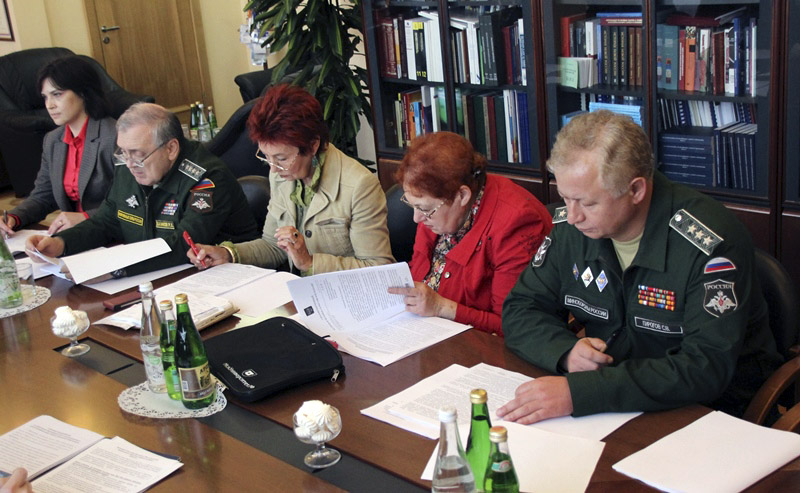
Ella Polyakova and other Soldiers’ Mothers of St. Petersburg at a
meeting with the Defense Ministry and members of the Presidential Human
Rights Council 2 September 2014.
No progress was made on
getting answers to previous inquiries about missing soldiers. The
Defense Ministry seemed to think it could placate the mothers by telling them of a recen tmass campaign launched in the army to send text messages to soldiers
to tell them to call their moms.
Obviously this wasn’t going to help the dozens who were
believed to have died in battle in Ukraine. But at least a dialogue was begun.
Nikolai
Pankov and Ruslan Tsalkikov, deputy ministers of defense and Sergei
Prigorov, director of the department of housing of the Defense Ministry
agreed to meet with the human rights advocates, including Mikhail
Fedotov, chairman of the Presidential Council, and Council members
Mariya Bolshakova, Irina Kirkora and Sergei Krivenko.
Also participating
in the meeting was Valentina Melnikova, head of the Union of Committees
of Soldiers’ Mothers; Igor Yevtushenko, Center for Military Civilian
Cooperation; Vera Teslenko, advisor to the department of servicemen’s
rights defense of the Russian Federation Ombudsman’s Office; Mikhail Davidenko, expert of the RF Ombudsman’s Office; and Sergei Yermolenko, head of Officers of Russia, a center for the defense of the rights of officers and their families,
The
issue of the rights of soldiers and the worsening situation in the East
of Ukraine as well as information about deaths of soldiers topped the
agenda.
Nikolai Pankov noted the importance of the work of the
Presidential Human Rights Council as a mediator between the ministry and
civil society. He said that after reports from human rights advocates
that mothers of many soldiers who were near the border of Ukraine were
not getting in touch with their families, on 31 August and 1 September,
the ministry conducted an action, “Call Mama,” in which hundreds of
thousands of soldiers throughout Russia received text messages,
“Remember your first steps to school. Call your Mom.” (September 1 is
the first day of school in Russia.) Many soldiers did call their mothers
and said they were not at war and were fine.
As for the urgent
question of where the missing soldiers were who didn’t call their
mothers, the Defense Ministry officials said they were checking the
information and would inform them at a later date about the results.
Pankov
noted the difficult of working under the conditions of an information
war, and urged the activists when getting reports about the violation of
the rights of soldiers to appeal to him in the first instance for the
most rapid investigation. The members of the Council proposed creating a
joint working group with the Defense Ministry to facilitate the
checking of all the alarming reports.
Ruslan Tsalikov described
new housing subsidies that had just gone into effect for the armed
services this August, and said that this would provide more permanent
housing for soldiers and remove the waiting list by 2016. Sergei
Pirogov also spoke about the issue of apartments for soldiers, and about
criminal activity of some officers who defrauded the army or other
people with these apartments.
Despite the fact that the Soldiers’
Mothers of St. Petersburg were just put in the “foreign agents” list,
the officials were still willing to meet with them. Currently, the group
does not receive any funding from abroad.
Sergei Krivenko and Ella Polyakova, members of the Presidential Council on Development of Civil Society and Human Rights, sent an appeal to the military investigation division of the Investigative Committee of Russia, the chief criminal investigative body of Russia.
A copy was sent to TV Rain, which has been keeping a list of soldiers who have been killed, wounded, taken captive or reported missing in Ukraine.
The appeal contains a list of nine names of soldiers who were in the 18th Motorized Rifle Brigade (army unit 27777).
Krivenko, who is coordinator of the Citizen and Army civic movement said he had received dozens of appeals from the relatives of those who have been killed, and they must be carefully investigated. Polyakova is the head of the Soldiers’ Mothers chapter in St. Petersburg.
Krivenko explained that the list of soldiers “was received from a partner organization, and not from relatives.” Krivenko told TV Rain (translation by The Interpreter)
“This list is not confirmed. We sent it to the Investigative Committee with a request to conduct a check. There is no reply yet.”
Krivenko used the Investigative Committee’s web site form to submit the appeal.
Some relatives have reported that they have been harassed for talking to journalists or human rights activists.
The names are as follows:
1. Rakhman Ramzanovich Dargiev, born 1976, sanitary instructor, private
2. Khizir Khuseynovich Ibragimov, born 1984, scout, private
3. Magomed Khizirovich Midayev, born 1984, scout, private
4. Vladimir Vasilyevich Fyodorov, born 1981, group commander, lieutenant
5. Arbi Umaltayevich Misirbayev, born 1978, senior scout, senior sergeant
6. Ibragim Said-Aminovich Zakayev, born 1981, scout, grenade-thrower, private
7. Mayrabek Makhmatsultanovich Makhmatkhaov, born 1979, sniper scout, private
8. Abdulkhakim Bayramailiyevich Aliyev, born 1990, sapper scout, private
9. Ismail Solmanovich Nazirov, born 1967, division commander, junior sergeant
The men are believed to be natives of Dagestan.
The Presidential Council is an advisory body of prominent members of civil society elected through Internet voting. The leader, Mikhail Fedotov, meets rarely with Putin; in a recent meeting he did not criticize Putin’s aggression toward Ukraine but focused on social work topics.
Even so, the members of this ineffectual body still see it as a channel to get publicity for their issues and see it as a perhaps a kind of immunity from harassment, although the beating of one member recently who had investigated complaints in Crimea indicated that the protection of membership in an official body may not be sufficient.
Russia news media have been ordered by Rossiya Segodnya general director Dmitry Kiselyev not to write about a report that the remains of missing journalist Andrei Stenin have been found, RIA Novosti reported.
“As before, we do not possess final results of a genetic examination. They will be published in the near future, but we do not have them yet. The funereal statements spreading today are premature and frankly amoral.
We ask colleagues and all others to refrain from them. We do not intend to hide anything and are in complete contact with the Investigative Committee. As soon as the examination is complete and the final result will be know, we will be the first to report this.”
Russian state media have kept up a campaign with a hash tag #освободитеАндрея (“Free Andrei”) ever since Stenin was reported missing in Ukraine August 5.
When his colleagues at Komsomolsaya Pravda found a car with the burnt remains of three people and camera equipment in it, they published a story at their newspaper website, but it was removed within a few hours. The OSCE Monitoring Group also reported the discovery of remains.
Gazeta.ru published an article 22 August in which they noted Steshin had commented on his Twitter account, “This morning I discovered at the same place a plaid shirt from a good Italian firm, with rolled-up sleeves, like the kind Andrei loved to wear…his size…” The tweet was removed.
Ukrainian authorities denied that they were holding him, and the Interior Ministry accepted a report that he was missing on 11 August. On August 12, Interior Ministry advisor Anton Gerashchenko told the Latvian radio station Balkom that Stenin had been arrested by the Ukrainian Security Service (SBU) and was suspected of “aiding terrorists,” but then later said that he had not been understood correctly, and that he had only meant to say he supposed the journalist was detained.
Translation: Remains of Andryukha Stenin identified, it looks like. RIA will soon announce. Unfortunately, I had long not doubted that outcome. RIP.
We wrote on 24 August of the formation of “anti-fascist committees” that planned to oppose Western influence and Ukraine’s Maidan protest movement. The members of the organizing committee are a who’s who of Russian nationalists who have long been promoting Putin’s agenda. It sounded as if this effort would be intellectual in nature, i.e. winning hearts and minds through publications, conferences and counter-demonstrations.
Now reactionaries who dislike Maidan have rolled out something more forceful, which they are calling “anti-Maidan volunteer corps” (druzhiny), Izvestiya reports. These volunteers are going to patrol alongside regular law-enforcement officers to “prevent anti-government, provocative actions on the part of the non-system opposition aimed at overthrow of the constitutional order.”
The “non-system” opposition are those parties and groups not registered or voted into parliament in highly controlled elections.
In a letter about their initiative, Sergei Aksyonov, the acting governor of the self-proclaimed Autonomous Republic of Crimea and Sergei Menyaylo, the mayor of Sevastopol, territories now forcibly annexed by Russia say they will make up volunteer corps of 10 people each and provide lists to the police. They said the volunteer corps will be made up of retired policemen, and that they are entitled to legally create such groups under the federal law on veterans.
Yevgeny Shabayev, head of the Anti-Maidan Council, said letters were sent to all the heads of regions that border Ukraine and also those in central Russia.
Vladimir Lepekhin, general director of the Institute for Eurasian Economic Community, such volunteer corps are needed because they can fulfill functions that police can’t.
These volunteers will have several tasks: monitoring the political space and developing techniques and reactions — for example, to conduct alternative actions. It is not a question of displacing the law-enforcement agencies but simply a system of state reaction should become more effective with the participation of the population as well.”
Yet Izvestiya also found a source to critique the concept. Senator Igor Morozov said that Maidan protests were unlikely in Russia, since Putin had a high rating and was meeting social needs.
Konstan Kalachev, head of a political expert group, said such volunteer groups was overkill: (translation by The Interpreter)
“Such actions on the contrary can provoke public dissatisfaction. The majority of the population already regards Maidan negatively, but they may overdo it. A repetition of the Ukrainian scenario in Russia is impossible.”
September 1 was the 10th anniversary of the Beslan tragedy, in which 334 people, including 156 children were killed after Russian forces stormed a school gymnasium in a North Ossetian town where terrorists had been holding them hostage.
The Russian state media has provided saturation coverage of this sad date, but from a decidedly one-sided perspective — and this year has even been re-writing history.
RT.com provided graphic coverage with pictures and video, but never question the actions of Russian troops and only has a brief mention of protests by the families, never mentioning their lawsuits.
Among the factually questionable points in this article is a claim that Dr. Leonid Roshal, a respected pediatrician, was “unwanted by the gunmen” although in fact he was in the list of people that the terrorists requested to speak to, as he had been involved in a previous successful hostage negotiation in 2002. RT even claims the terrorists confused Roshal with Vladimir Rushailo, who was Russia’s Interior Minister in
1999-2001, but that wasn’t the case, it was the Russian negotiators who did.
RIA Novosti ran an article headlined: Alpha Veteran on Beslan Hostage Crisis: Terrorists Refused to Negotiate.
“The terrorists placed most of the hostages in the school’s gym while
searching the building. In order to avoid any bloodshed, the task force
decided to try negotiating with the terrorists. The insurgents refused
to talk, demanding that Russia pull its troops out of Chechnya. The
security services decided to continue the negotiations, but they failed
to bring any substantial results, Yury Torshin, a veteran of the
FSB-operated Alpha special forces troops, said.
“We requested [them] to hand over water and some medicine to the
children, but the terrorists refused to do this. As part of the scare
tactic, they shot about 10 hostages dead and threw the bodies to the
ground from the second floor,” Torshin added.
In a longer version of the article, this statement is added:
Col. Torshin: Realizing
the gravity of the situation, on the second day we repeated our request
to bring in food and water to the hostages. It was hot, the temperature
was 25 degrees, but they refused again. At that point Ruslan Aushev
(the first President of the Republic of Ingushetia and Chairman of the
Warriors-Internationalists Affairs Committee at the CIS Prime Ministers’
Council since 1991 – ed.) joined in the process. He said he would go
inside and talk with the terrorists. A corridor was organized for him;
he was allowed to enter the school’s grounds and talked with them, but
eventually they denied his request. I cannot say what he discussed with
the militants and with whom he talked exactly but as he left the school,
Aushev brought out three or four kids.
As the New York Times account shortly after the hostage crisis described, however, Aushev in fact took out 11 mothers and 15 babies — 26 people in total — but one mother returned to her older children left inside. He also got a handwritten list of demands concerning the independence of Chechnya and the withdrawal of Russian troops. But he was blocked from further involvement.
Jamestown Foundation wrote at the time of the Russian effort to smear Aushev and write him out of the story or misrepresent his role; in fact he had come at the invitation of the FSB, but this was denied later.
The definitive book on Beslan is likely still to be written, but meanwhile there are the films of one of the foremost experts, Jonathan Sanders, who befriended a survivor and spent many months living in Beslan and learning the stories of the families. These resulted in one film for CBS called “Three Days in September” and another feature for 48 hours
There is also the classic reconstruction of the narrative from the first person perspective done by war correspondent C.J. Chivers for Esquire. This is likely the most definitive account enabling the reader to understand the victims’ awful experience.
This account telescopes the 1990s and the Chechen wars to a paragraph or two, however, so it doesn’t explain how the Chechen terrorist movement became what it was.
Nothing ever justifies terrorism, ever. It’s helpful, however, to understand the dynamics of how the Kremlin’s mass crimes against humanity in two wars in Chechnya — which it was supposed to prosecute as a condition of joining the Council of Europe and never did — set the stage for later terrorist attacks.
And this account does not analyze or condemn the role of the Russian forces, which are widely criticized for refusing to attempt further negotiations and storming the building and killing most of the hostages in the process, just as they did in another terrorist crisis during the play “Nord Ost” at a Moscow theater.
In this regard, the Wikipedia essay on Beslan does a credible job of bringing together the critical research regarding the Russian forces’ responses.
As Radio Free Europe/Radio Liberty, the US-funded broadcaster reported, a group of the survivors of Beslan have now taken their case all the way to the European Court of Human Rights.
Activists from the NGO Mothers of Beslan told RFE/RL on September 1
— the anniversary of the takeover of the school that led to the tragedy
in 2004 — that the European Court of Human Rights in Strasbourg will
begin hearing their case against the Russian government on October 14. […]
The activists insist that a decision by Russian officials to storm
the school instead of negotiating led to the ensuing bloodbath that
killed 334 people, including 186 children.Russian officials said they only gave the order to storm the school
after hearing an explosion and said they had no choice but to intervene
to prevent the hostage-takers — who were mostly from Chechnya and
Ingushetia — from killing the students and teachers.
The school siege in Beslan followed deadly bombings of Russian
airliners and a Moscow subway station that were blamed on militants from
the North Caucasus and precipitated what Kremlin critics say were steps
by President Vladimir Putin that curtailed political freedoms.
The advocacy group Freedom House said on September 1 it was concerned “by the Russian Federation’s refusal to conduct a forthright, transparent investigation” of the Beslan tragedy.
Protesters against Russia’s war in Ukraine tried to stage a candlelight vigil Sunday night but were arrested. Novaya Gazeta‘s Nataliya Zotova reported on the vigil (translation by The Interpreter):
The memorial action should have taken place simultaneously in Moscow near the Kiev Station, and in Kiev on Mikhailovskaya Square, symbolically connecting the two capitals.
In Moscow, the activists put out a line of candles on the wall along Berezhkovskaya Embankment. They had planned to put out 2,249 candles — the number of civilians reported killed in the southeast Europe in last week’s report published by the UN Office of the High Commissioner for Human Rights. But they didn’t manage to — the police showed up.
“Respected citizens, put out the candles, this is forbidden in a public place!” a policeman announced, and then began putting out the candles one by one himself.
“Where is it said that in a public place, it is forbidden to light candles? What’s the law, the code, the act?” the activists insisted on asking.
“Let me tell you down at the station,” the law-enforcer replied.
“I’ve come to remember those who died in the conflict in Ukraine, on both sides,” Dmitry Kartsev, an employee of Gazeta.ru who had come as a participant of the action, told Novaya Gazeta. “This is not a political action…” A minute later, Dmitry and another 6 people wound up in a police van.
Shura Burtin, organizer of the action, a correspondent from Russkiy Reporter, and another 20 people remained on Evropa Square — they had come later and had not been noticed by police.
“Can you go around town with lit candles? It turns out it’s a demonstration of restraint: you can’t even put a candle on the wall. But in your hands, it’s even more visually effective, I can tell you that as an exhibit worker,” said Alisa, another participant. “I’m not an activist at all, I’m a person who is bitter, that people died, died due to stupidity,” she explained to me.
“People died who don’t even know the truth about what is happening. I have a friend who went to Donbass as a volunteer. And died — that’s it, the guy’s gone.”
The demonstrators who still remained free went on to the other side of the Moscow River and put the candles not on the wall, but on the sidewalk, so that the wind wouldn’t blow the flame away. The candles went out anyway, and they had to be lit anew. They made a large glowing number “2,249” out of the candles and the words “Stop War.”
“That information is a week old, there are likely more who have died now,” Burtin noted. [UNOHCHR told Reuters that the toll was now 2,593, not counting MH17 victims.]
The police never noticed the extension of the action, and the participants went their ways peacefully. They decided to leave the number made out of candles on the road.
“That was useless, even laughable,” said Anya, another participant. “But something had to be done. You don’t want to lost the remnants of your human face.”
OVdinfor.org, the police monitoring group, said the six candle-lighters detained earlier at the Embankment were taken to the Dorogomilovsky Precinct and were let go after agents in plainclothes questioned them, trying to learn who organized the action.
A number of people held single protest pickets over the weekend 30-31 August — the theory is that if just a lone protester stands on the street, he will not require a permit for a demonstration, nor be picked up by police.
Translation: Picket by Shenderovich. Sign: War with Ukraine is a shame and a crime.
Translation: Anti-war picket in Yekaterinburg.
Signs:
Your husband/son/brother/grandson in the army? In training in Rostov Region? Don’t wait for Cargo 200! Sound the alarm!
Patriots Defend Motherland. Occupiers Fight with Other Countries!
How Did It Happen That Brothers Became Sworn Enemies?
Putin: You’re Warring Against Me #RussianInvadedUkraine
TV Rain published some photos on their Facebook page:

Translation: Sign: “Make Love Not Novorossiya”
Aleksandr Podrabinek of grani.ru also posted photos on his Facebook page:
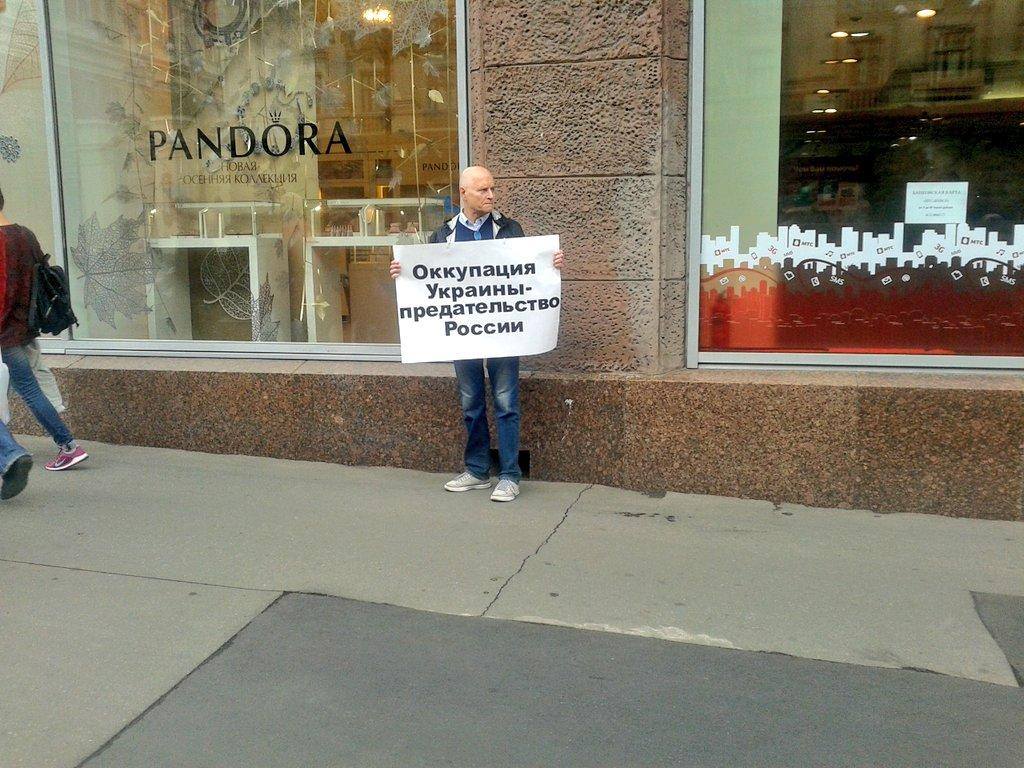
Translation: Sign: Occupation of Ukraine is Betrayal of Russia.
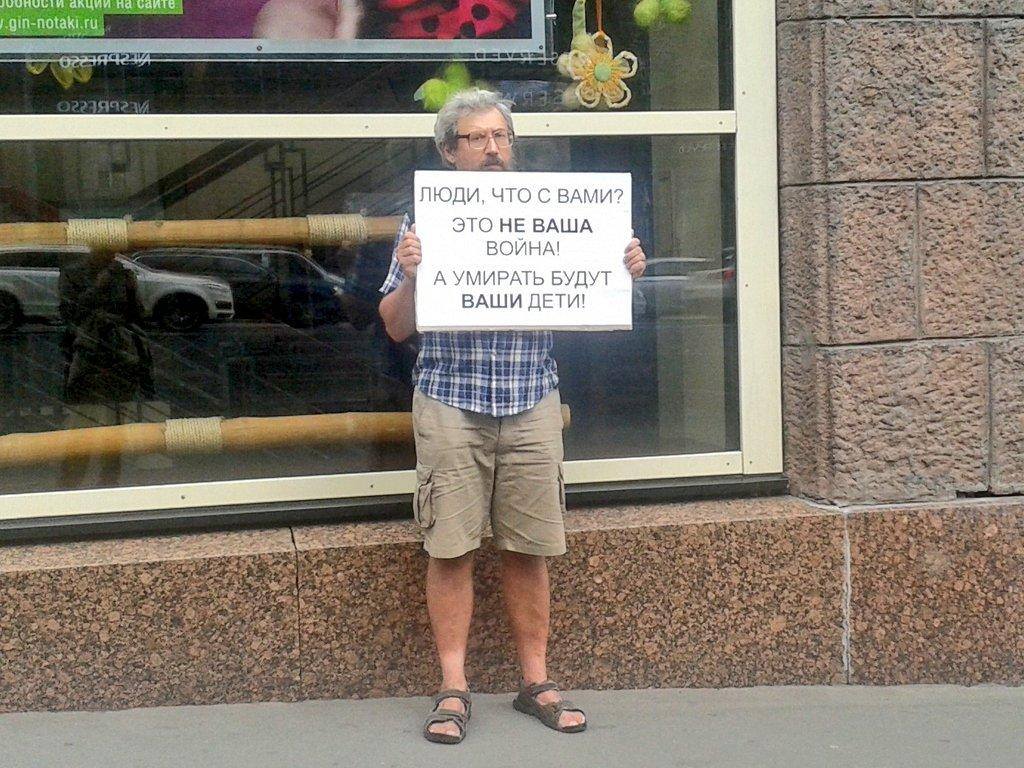
Translation: Sign: People, what’s wrong with you? This is not your war, and it’s your children who will die.
Nonetheless, five people were picked up by police in Moscow for protesting against the war in this way today, OVDinfor.org, the police monitoring group reported.
Among them was composer Aleksandr Manotskov.
A video was uploaded to YouTube by grani.ru showing lone picketers as well as the protesters with signs who came to Manezh Square last week and were detained by police.
Grani.ru also interviews a number of young men of draft-age who say they don’t want to fight in the war with Ukraine and were critical of Putin as a ruler. Several said they supported Putin, but others thought it was wrong to fight in a foreign country.